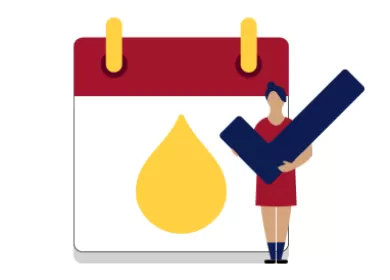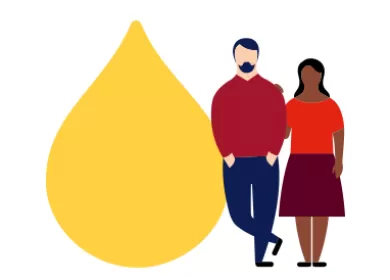Michael Klim, plasma recipient.
“An autoimmune disease took everything from me. Plasma donors helped me get it back.”
What is plasma?
Plasma’s the yellowish liquid part of your blood that holds all the other blood cells. It’s used in a whopping 18 different life-giving ways.
Why give plasma instead of blood?
When you give a blood donation, it contains some plasma. But, when you donate just plasma, you give about twice as much. That’s more plasma to help more people!
How does giving plasma work?
Arrive at the donor centre, check in and fill out the donor questionnaire.
Have a chat to a staff member and go over your questionnaire answers.
Donate!
It’s called ‘apheresis’, and it’s pretty straightforward. While you’re resting in a comfortable chair, a special machine draws blood from your arm. The machine separates the blood out to collect the plasma. It’s a yellowish colour because your red cells, which make your blood red, are returned to you during the donation.
Rest for a few minutes. There’s no need to rush.
Eat up! Have a snack and a drink before you go.
Plasma donation essentials

How often can I give plasma?
As often as every 2 weeks, if you like. Donate when it suits you — many donors find once a month works nicely. Changing more lives more often? Yes please.

How long does it take?
Leave about 1.5 hours whole appointment, but the donation itself takes about 45 minutes. You can scroll your phone, read, watch TV or just enjoy some uninterrupted down time.

Are there any side effects?
They’re mostly the same as when you give blood. You can reduce the chances of them by being prepared — that means drinking plenty of water, getting a good sleep, and having a salty snack.
Prepare and aftercareHelp more people more often
There are thousands of reasons to give plasma. Why will you?
Whether you’re supporting a loved one in need or just trying to make a difference, your reason is as unique as you are.
18 life-changing plasma treatments
Discover the many ways plasma is used
- Chicken pox
-
Chicken Pox can be a serious illness. Thankfully, doctors can use Zoster Immunoglobulin, which provides temporary protection against Chicken Pox.
- Brain disorders
-
Brain Disorders can happen when our immune system malfunctions. Thankfully, scientists have put their heads together and developed intravenous immunoglobulin (IVig), a mixture of antibodies that can help make hostile immune systems less of a headache.
- Immune deficiencies
-
When you donate plasma, you’re also donating unique antibodies. Your plasma can be mixed with plasma from other people to create a super army of lifesaving germ-fighters. This superweapon can help people with immune deficiencies.
- Tetanus
-
So you’ve accidentally caught yourself on a rusty fence? An intramuscular injection of Tetanus Immunoglobulin-VF normally does the trick, helping fight tetanus before it takes hold.
- Tetanus infection
-
If you come into contact with tetanus without being adequately vaccinated, and do develop tetanus infection, a dose of Tetanus Immunoglobulin into your blood can help mop up some of the toxins before they do more damage.
- Rh disease
-
In some cases when two people with different Rh (D) types (that’s the +/- in your blood type) have a child, an Rh (D) negative mother’s immune system may produce antibodies that can destroy the red blood cells of their Rh (D) positive child. Plasma helps prevent Rh disease, with a treatment given to affected pregnant women.
- Measles
-
For those who can’t be vaccinated against measles, plasma can save the day. It’s used to make a medication called normal human immunoglobulin (NHIG), which can provide temporary protection.
- Thrombotic thrombocytopenic purpura (TTP)
-
You’ve likely never heard of it, but left untreated, TTP can have fatal consequences. It’s a rare blood disorder, and a daily plasma exchange can help prevent the associated formation of blood clots.
- Liver disease
-
One of your liver’s 500 unique functions is to produce clotting agents, which help stop you from bleeding. When it’s damaged, the supply of these agents can dry up. In these cases, plasma can help prevent or stop bleeding complications that arise from liver disease.
- Bone marrow transplants
-
After chemotherapy, some cancer patients will need to have their bone marrow replaced, and some are at particular risk of very severe infections during their transplant due to their weakened immune systems. The antibodies within plasma can help prevent infections during bone marrow transplants.
- Haemophilia
-
Haemophilia affects your blood's ability to clot. Plasma can be used to make products that can replace missing clotting factors, helping people with haemophilia live a relatively normal life.
- Deep vein thrombosis
-
In some people, deficiencies of certain blood factors can increase their risk of developing deep vein thrombosis (DVT). Treatment with plasma products can help restore normal blood function by replacing these important 'anti-clotting' factors.
- Heart surgery
-
Lifesaving surgeons who perform heart surgery do so with cryoprecipitate at their side, which can treat complications during heart surgery.
- Haemorrhages
-
Haemorrhages are among the most challenging issues any surgeon will face. A transfusion of a special plasma product that replaces vital clotting factors, can help to stop critical bleeding.
- Rare blood disorders
-
A very small percentage of the population, have inherited rare blood disorders. They may have complicated names, like “congenital dysfibrinogenaemia” or “von Willebrand disease”, but often the treatment is quite simple - regular transfusions of treatments made from plasma.
- Hepatitis B
-
If you’re exposed to Hepatitis B and haven't been vaccinated, there is a plan B – a treatment made from plasma.
- Kidney disease
-
If your kidneys fail due to kidney disease, Albumin, a protein extracted from plasma, can be used in the treatment.
- Severe burns
-
Plasma can offer patients suffering severe burns some relief. Albumin, can help replenish and replace lost fluid and proteins, preventing a patient from going into shock.




